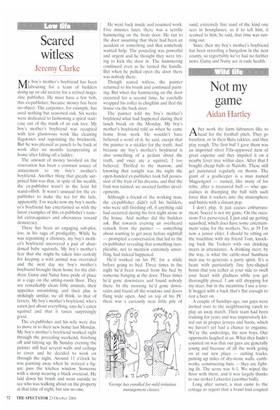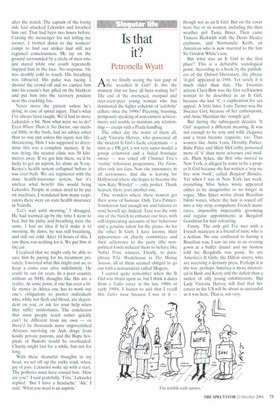Not my game
Aldan Hartley
After work the farm labourers like to head for the football pitch. They go barefoot, or in their Bata takkies, and they play rough. The first ball I gave them was an imported silver Fifa-approved item of great expense and they impaled it on a nearby fever tree within days. After that I bought cheap balls in Nairobi. These still get punctured regularly on thorns. The giant of a goalkeeper is a man named Magoolgool — named, like many of his tribe, after a treasured bull — who specialises in thumping the ball with such force that it rockets into the stratosphere and bursts with a distant pop.
I don't play. It just causes embarrassment. Soccer is not my game. On the occasions I've persevered, I just end up getting squashed, which does have some entertainment value for the workers. No, at 39 I'm now a junior elder. I should be sitting on the touchline with my friend Tom, knocking back the Tuskers with our drinking steers in attendance. A drinking steer, by the way, is what the cattle-mad Samburu men use to generate a party spirit. It's a beast with particularly fine lyre-shaped horns that you tether at your side to swell your heart with gladness while you get thoroughly pissed. I am still shopping for my steer, but in the meantime I use a lovely hogget with a back that's flat enough to rest a beer on A couple of Sundays ago, our guys were invited over to the neighbouring ranch to play an away match. Their team had been training for years and was impressively kitted out in proper jerseys and boots, which we haven't yet had a chance to organise. We're the underdogs, the new boys. Our opponents laughed at us. What they hadn't counted on was that our guys are generally young and because of all the work going on at our new place — cutting tracks, putting up miles of dry-stone walls, earthworks, constructing huts — they arc fighting fit. The score was 4-1. We wiped the floor with them, and it was largely thanks to our striker Lekurdoi (another bull),
Long after sunset, a man came to the cottage to report that a brawl had erupted
after the match. The captain of the losing side had attacked Lekurdoi and knocked him out. That had been two hours before. Cursing the messenger for not telling me sooner, I trotted down to the workers' carnpi to find our striker had still not regained consciousness. He by on the ground surrounded by a circle of men who just stared while one youth repeatedly slapped him in the face. No response. He was deathly cold to touch. His breathing was laboured. His pulse was racing. I shooed the crowd off and we carried him into his cousin's hut, piled on the blankets and put him into the recovery position near the crackling fire.
Never move the patient unless he's dying, in case of spinal injury. That's what I've always been taught. We'd had to move Lekurdoi, a bit. Now what were we to do? Even Where There is No Doctor, our medical bible in the bush, had no advice other than to stay put unless the injury was lifethreatening. How I was supposed to determine this was a complete mystery. If he was dying, the nearest clinic was 50 kilometres away. H we got him there, we'd be lucky to get an aspirin, let alone an X-ray. Kenya's health system collapsed before it was ever built. We are registered with the state health-insurance system, but it's unclear what benefit this would bring Lekurdoi. People in comas need to be put on machines. I wondered how many respirators there were on state health insurance in Nairobi.
'Let's wait until morning,' I shrugged. He had warmed up by the time I went to bed, but his pulse and breathing were the same. I had no idea if he'd make it to morning. By dawn, he was still breathing, and still out cold. After 14 hours of this, I saw there was nothing for it. We put him in the car.
I realised that we might only be able to save him by paying for his treatment privately. I worried what this might cost us, to keep a coma case alive indefinitely. He could be out for years. In a poor country without an NHS, thoughts like this are a reality. At some point, if one has even a little money in Africa one has to work out one's obligations to poorer individuals who, while not flesh and blood, are dependent on you, or ask for your help when they suffer misfortunes, The conclusion that most people reach rather quickly can't be different from my own — or there'd be thousands more impoverished Africans surviving on Aids drugs from kindly private patrons, and the Bupa hospitals of Nairobi would be overloaded. Charity might last for a while, but not for long.
With these shameful thoughts in my head, we set off up the rocky road, when, joy of joys, Lekurcloi woke up with a start. The potholes must have roused him, 'How are you?' I said gratefully. 'Fine,' Lekurdoi replied. 'But I have a headache.' Ah,' I said. 'What you need is an aspirin.'

























































































 Previous page
Previous page